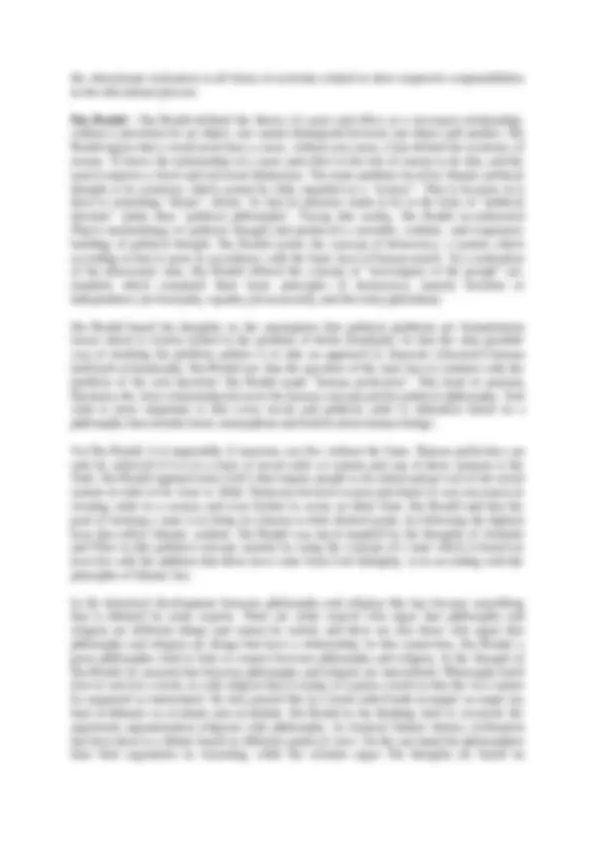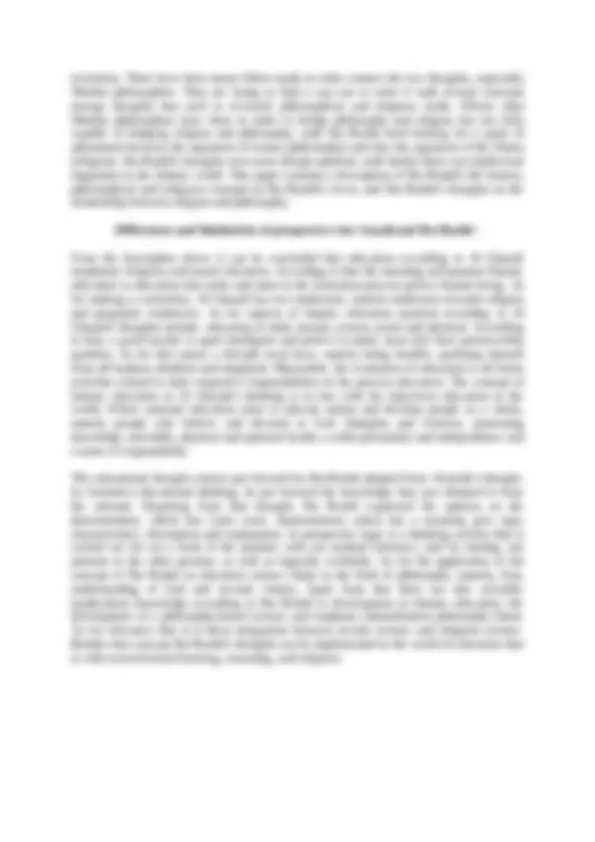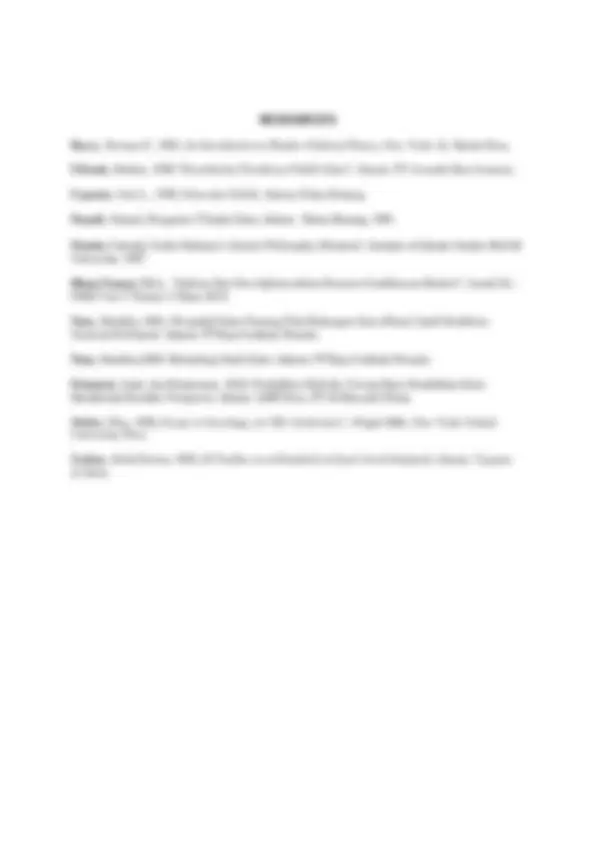





Study with the several resources on Docsity

Earn points by helping other students or get them with a premium plan


Prepare for your exams
Study with the several resources on Docsity

Earn points to download
Earn points by helping other students or get them with a premium plan
Community
Ask the community for help and clear up your study doubts
Discover the best universities in your country according to Docsity users
Free resources
Download our free guides on studying techniques, anxiety management strategies, and thesis advice from Docsity tutors
Selcuk University - Neba Wais Alqorni - History of Islamic Thought
Typology: Assignments
1 / 5

This page cannot be seen from the preview
Don't miss anything!




1. Write an academic essay about Gazali’s and Ibn Rushd views on religion and politics. This essay must compare the views of two thinkers. Al-Ghazali :. Al-Ghazali's create book include: Ihya Ulumuddin, Tahafutul Falasifah, Qowaid Al-Aqaid, Misykatul Anwar, Al-Munqids minad-dalal. Al-Ghazali’s Political Thought was in the background by Al-Ghazali’s Experience with the world of power at the time and his worldly scientific background. The salient feature of Al-Ghazali's figure is his expertise in tasawwuf and the rise of spirituality. Many political practices deviate from the path of sharia, such as corruption, abuse and crises of scholars The leader is the Protector of the Implementation of the Shari'ah, the course of divine law becomes the responsibility of a ruler and according to Al-Ghazali the state is very urgent anti- dichotomous thinking. Religious order could not be produced except by a priest. The politics of good deeds if carried out using according to the religious shari'ah, if the ruler commits tyranny should be avoided. Al-Gazali inherited a vast and diverse heritage which he managed to reinterpret in a changing world. An innovative exploration of the change and continuity present within Muslim discourses, this book brings together disparate threads of the Islamic tradition, religious exegesis, the contemporary Arab Middle East, the Islamic state and idea of renewal in al-Ghazali’s thought. As well as being one of the first complete treatments of Al- Ghazali’s works, this book provides an original critical approach to tradition and its capability for innovation and change, countering the dichotomy between tradition and modernity that typically informs most scholarly studies on contemporary Islam. According to him, humanitarian practice is derived from holistic aspects, harmony, and devotion to God. In the end, it can help in realizing good governance. So, there is a close relationship between state, politics and social life. That is the core thought of Al-Ghazali, as described in Al-Ghazali on Social Justice for a New World. Government is a gift from God. The implementation is carried out by the chosen people and they are accountable to God. The task of the government, explained Al-Ghazali, is to bring prosperity to all people through the principles of justice according to religious orders. The opposite, namely disorder and rampantly moral disease. Al-Ghazali offers the concept of an ideal state. He argued, the most important elements in a country are individuals. If each individual can act correctly and do not commit irregularities, the expected state will emerge. Therefore, the individual must have advantages. One of them, morally and spiritually strong. In addition, they must also be equipped with sufficient knowledge. Superior individuals will emerge from a combination of the two. In this connection he supports the concept of the individual in society. The results of this study are that education according to Al-Ghazali emphasizes religious and moral education. According to him, the meaning and purpose of Islamic education is education that seeks and aims in the process of forming a complete human being. As for making a curriculum, Al-Gazali has two tendencies, namely a tendency towards religion and a pragmatic tendency. The material aspects of Islamic education according to Al Ghazali's thought include: education of faith, morals, reason, social and physical. According to him, a good teacher in addition to being intelligent and perfectly intelligent, must also have commandable qualities. As for the qualities that must be possessed by a student, namely being humble, purifying himself from all the ugliness of being obedient and istiqamah. Meanwhile,
revelation. There have been many efforts made in order connect the two thoughts, especially Muslim philosophers. They are trying to find a way out to solve it until several concepts emerge thoughts that seek to reconcile philosophical and religious truths. Efforts what Muslim philosophers have done in order to bridge philosophy and religion has not fully capable of bridging religion and philosophy, until Ibn Rushd tried looking for a point of adjustment between the argument of reason (philosophy) and also the argument of the Sharia (religion). Ibn Rushd's thoughts were more deeply spiritual, until finally there was intellectual stagnation in the Islamic world. This paper contains a description of Ibn Rushd's life history, philosophical and religious concepts in Ibn Rushd's views, and Ibn Rushd's thoughts on the relationship between religion and philosophy. Differences and Similarities of perspective view Gazali and Ibn Rushd : From the description above it can be concluded that education according to Al Ghazali emphasize religious and moral education. According to him the meaning and purpose Islamic education is education that seeks and aims in the formation process perfect human being. As for making a curriculum, Al Ghazali has two tendencies, namely tendencies towards religion and pragmatic tendencies. As for aspects of Islamic education material according to Al Ghazali's thoughts include: education in faith, morals, reason, social and physical. According to him, a good teacher is apart intelligent and perfect in mind, must also have praiseworthy qualities. As for that nature a disciple must have, namely being humble, purifying himself from all badness obedient and istiqamah. Meanwhile, the evaluation of education is all forms activities related to their respective responsibilities in the process education. The concept of Islamic education in Al Ghazali's thinking is in line with the objectives education in the world. Where national education aims to educate nation and develop people as a whole, namely people who believe and devoted to God Almighty and virtuous, possessing knowledge and skills, physical and spiritual health, a solid personality and independence and a sense of responsibility. The educational thought context put forward by Ibn Rushd adopted from Aristotle's thought. In Aristotle's educational thinking, he put forward the knowledge that was obtained is from the rational. Departing from that thought, Ibn Rushd expressed his opinion on the demonstration, which has Latin roots: demonstration which has a meaning give sign, characteristics, description and explanation. In perspective logic is a thinking activity that is carried out for set a truth of the premise with use method inference, and by relating one premise to the other premise, as well as logically verifiable. As for the application of the concept of Ibn Rushd in education science Islam in the field of philosophy, namely; first, understanding of God and second, charity. Apart from that there are also scientific implications knowledge according to Ibn Rushd to development in Islamic education: the development of a philosophy-based science and emphasis rationalization philosophy Islam. As for relevance that is is there integration between secular science and religious science. Besides that concept Ibn Rushd's thoughts can be implemented in the world of education that is with research-based learning, reasoning, and religious.
Barry , Norman P., 1981, An Introduction to Modern Political Theory , New York: At. Martin Press. Effendy , Bahtiar, 1998 “ Disartikulasi Pemikiran Politik Islam ”, Jakarta: PT. Serambi Ilmu Semesta. Esposito , John L., 1990 , Islam dan Politik , Jakarta: Bulan Bintang. Hanafi , Ahmad , Pengantar Filsafat Islam , Jakarta : Bulan Bintang, 1991. Husein , Fatimah, Fazlur Rahman’s Islamic Philosophy , Montreal : Institute of Islamic Studies McGill University, 1997. Ilham Usman , Muh., “Sufisme Dan Neo-Sufisme dalam Pusaran Cendikiawan Muslim” , Jurnal AL- FIKR Vol.17 Nomor 2 Tahun 2013. Nata , Abuddin, 2001, Perspektif Islam Tentang Pola Hubungan Guru-Murid; Studi Pemikiran Tasawuf Al-Ghazali. Jakarta: PT Raja Grafindo Persada. Nata , Abuddin,2009. Metodologi Studi Islam. Jakarta: PT Raja Grafindo Persada. Primarni , Amie, dan Khairunnas. 2016. Pendidikan Holistik; Format Baru Pendidikan Islam Membentuk Karakter Paripurna. Jakarta: AMP Press, PT Al Mawardi Prima. Weber , Max, 1996, Essays in Sociology , ed. HH. Gerht dan C. Wright Mills, New York: Oxford Universuty Press. Zaidan , Abdul Karim, 1984 , Al-Fardhu wa al-Daulah fi al-Syari’ah al-Islamiyah , Jakarta: Yayasan al-Amin.